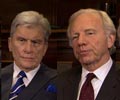Jeroen Van Der Veer CEO, Royal Dutch Shell
 Read his full interview >
Read his full interview >
As a company, all our focus is - what can we do about it [CO2 emissions] in our operations? Or how far can we cut? What can we do more? What can we do for our customers? And, of course, we do research to see whether we can develop products or services with a relative lower CO2 content.
So we bring it simply back to business. And that's what we should do, that's our role.
You were quoted in the London Guardian as saying it was not up to Shell to solve the world's CO2 problem. If you don't solve it, who will?
I think that it's not up to Shell to solve the world's CO2 problems. On the other hand, I think the CO2 problem in the world cannot be solved without active cooperation from energy industries like Shell. So it is not that we don't have to play a role, but we should limit the role to our cooperation. ...
... So your definition of corporate responsibility, if I understand you right, is to play by the rules?
No. The corporate social responsibility has two aspects. First of all, you have always to play within the rules; otherwise you don't have accountability as a company. ... But secondly, of course, take the example of oil sands: [There] are certain rules that all the players comply with that. But then if you have good technology or good working practices or something else, then you can play it even better than ... the competition. So we play better, then build up. ...
So what you're saying is that Shell goes into the situation and looks to do a relatively cleaner job in a very dirty business.
Yeah, I disagree that it is a dirty business. [That depends] what you compare it with. ...
But oil from tar sands is a very high-CO2-emitting business proposition.
You have to look at it in an energy mix. It may be more CO2 than light oil. It may be less CO2 than coal. ... And one has to say: "How about energy security? How about the possibilities to do something with the CO2 coming out of the oil sands?" You should not only look at the situation today, but what opportunities has this energy form for the future to make it more clean. Let me put it that way, because that sounds a hell of a lot better than less dirty.
More clean is better than less dirty. ... I mean, people don't understand it. They just see you saying that you're going to be more clean in what essentially is a very bad proposition. What people want is for businessmen to take bigger leadership roles because you have the resources, the know-how, the wherewithal to do that, whereas governments in many cases are weak, disorganized. The legislative processes are long and slow. ... So it's up to you guys.
Yeah. But that's naive.
Sen. Joseph Lieberman and Sen. John Warner Co-sponsors, America's Climate Security Act of 2007
 Read their full interview >
Read their full interview >
I talked to the CEO of Shell, Mr. [Jeroen] van der Veer, who said that it's not Shell's responsibility to clean up the world's CO2 problem. Is he right? He says it's your responsibility to regulate.
Sen. Lieberman: Well, maybe it's our responsibility to tell the president of Shell that he's got a responsibility to clean up the problem. And that's what law is about. You adopt laws because people aren't of their own [volition], voluntarily, doing the kinds of things that will help the public interest ...
What is corporate responsibility in this context?
Sen. Lieberman: Corporate responsibility, I think, is to recognize from the science, not from the politicians, that there's a real problem here of global warming. And they got to be part of trying to figure out how to solve it, particularly if they're in businesses that are substantially contributing to the problem.
He said that was naive.
Sen. Lieberman: I don't know why it's naive. I think it's quite hard-nosed and real. I mean, "Oh, a part of the problem here is oil" -- now that's a tough statement if you're in the oil business, because it's pretty clear that there's no way particularly to burn oil clean. What we're talking about here is figuring out different ways to power our society. And part of that is by law. You just got to require it. ...
You're going to put the oil business out of business?
Sen. Lieberman:No, no, they've got a long time in business, for better or worse. ... [I]n the long run we've got to diminish the extent to which we use oil in this country and in the world to create power and electricity. ...
Frank O'Donnell President, Clean Air Watch

We ought to understand that there is a real difference here. Just because a corporation wants something doesn't mean it's in the public interest. They want something because they've judged it's in the best interest of their stockholders to boost their stock price. Everything they do is based on that decision. [It is] not illegal. It's how it works in America. What's good for General Motors is not necessarily good for America, to take a twist on the old saying.
Jeffrey Ball The Wall Street Journal
 Read his full interview >
Read his full interview >
These companies don't exist to be morally upstanding, although they would certainly tell you that they want to be. They exist to make money for their shareholders. They will respond to the signals with which they're presented in the market. And I think that, at the end of the day, is where this whole question come around to. …
[Do they want to slow down the process?]
I'm not sure the point is that they want to slow the process down. I think the point is that they are not convinced that they have the signals that justify speeding it up. And here's where we come to Washington.
About a year ago, essentially, CEOs of a large number of big industrial companies in all these industries got together in this organization called USCAP [U.S. Climate Action Partnership] and it was quite an interesting declaration. They basically called for carbon regulation -- a huge switch from their public lobbying positions in the past. Why did they do it? Well, they didn't do it because suddenly, they changed their environmental outlook. They did it because they could read the political handwriting on the wall. And it became clear to them that that politics had changed such that they were going to get hit, likely with something like this. And it would behoove them and their shareholders to shape it, rather than get shaped by it. …
They're also worried about state-by-state regulation...
Yeah. .... What these companies are presented with is the really scary specter of differing regulations in multiple states, and a hugely inefficient regulatory system. And so, they are now deciding that [it would be] better to go to Washington and be presented with one regulation than with many, and hopefully, in their view, one regulation they have a better chance of shaping, because many of these industries are actually more powerful in Washington than they are in the capitals of many of the states that are making these regulations. …
Is it naive to raise the issue of corporate responsibility?
No. But different people define that term differently. And there's a big debate within these companies about whether corporate responsibility means delivering the best quarterly result to your shareholder or whether it means reducing emissions into the atmosphere.
Is there any shift in that?
I think these CEOs are asking that question. I think they think there is a shift in that. But again, these are all very amorphous issues. And these questions are going to be answered in the space of decades. So these folks are in a tough spot. They are having to make decisions that are going to have a real economic impact on their company soon when it's not going to be clear for years whether those decisions are the right ones. …
T. Boone Pickens President, BP Capital
 Read his full interview >
Read his full interview >
There is this idea that's out there -- maybe it's just a quaint idea, but it's called corporate responsibility. Is there a point at which corporate responsibility changes in the face of what some people say is a crisis? It certainly did during World War II.
World War II, you had industries switching over to--
Because they were told to.
That's right; they were told to. You know, if Toyota comes out with a pickup truck and that truck gets 35 miles to a gallon and all at once the price of gasoline is $5 a gallon, that truck's going to get a lot of attention. And they'll go to 500,000 vehicles pretty damn quick. It's just market reaction to what the consumer wants.
Is there a larger responsibility to address what many are agreeing is a national crisis or a global crisis?
I don't think everybody's to a global crisis yet. Maybe it's just me that's there.
You think it's a crisis?
Yeah. And it's going to be changing continually. But I have a lot of confidence in corporate America. Believe it or not, I do. They'll make changes that'll fit what's going on, and they'll meet the markets.
But I don't think you're gonna have a crash program where you're going to say, "Hey, does everybody agree we're now in a crisis? So what we've got to do is we've all got to change and we've got to do a better job of what we're doing." That's a weak pitch. That's a breakfast meeting and everybody claps their hands and goes off, doesn't mean anything.
Mindy Lubber Shareholder advocate
 Read her full interview >
Read her full interview >
What is corporate responsibility?
Well, corporate responsibility means a lot of things to a lot of companies. But in my judgment, it means is taking a slightly broader look at what it means to run a corporation, looking at impacts on labor, looking at impacts on sustainability, figuring out the cost of polluting.
But this is what you think corporate responsibility should be. I'm asking you, is this a term with any coherent definition across business? I mean, we hear them talk about it all the time, but obviously it seems to me Exxon has a very different idea than GE what corporate responsibility might be.
Well, Exxon does have a different idea. But we are seeing more and more companies realize that issues like global warming, like water shortages, those issues have a financial role in which corporations do well or not, and they've got to be factored into the strategic planning of a company. And any company that's not looking at issues like that and factoring them into their risks and into their opportunities and how they might retool their manufacturing systems, what kind of new products to bring out, those are companies that are not going to do well in the long run. So corporate responsibility, it is looking at the impacts that their company has on the world around them.
But it's a term that's, in a way, up for grabs, isn't it?
Up for grabs, sure. But we're seeing more and more of it every day.
Beth Lowery Vice president for environmental affairs, General Motors
 Read her full interview >
Read her full interview >
How do you define corporate responsibility?
I think it's very important that a corporation is focused on a number of issues. In corporate responsibility we talk about economics; we talk about environment; we talk about social responsibility. So, for example, when we go into various areas of the world, it's very important for us to address the economic impacts of providing jobs, as well as making sure we're taking care of environmental issues and that we're doing our part to provide transportation. That's very important from a personal-mobility standpoint.
Does any one issue among those that you just listed take priority over any other?
Actually, with respect to corporate responsibility, I think it's very important that we have all those as much in balance as we can.
Dr. Ling Wen CEO, Shenhua Energy
 Read his full interview >
Read his full interview >
So let me ask you this. When do you expect -- cost aside -- when could you capture and store all the carbon dioxide that your thousands of power plants are generating?
I cannot give you that prediction. The first thing is, it's not a major business model. And globally, there is no successful large commercial example. So it's not only us.
The first thing is we should have the feasibility study. The second thing is we must have some direction from the government, right? And the third thing is we must be responsible for all of the shareholders. We must create money, not lose the money. It's my responsibility as a CEO of this company.
Your responsibility is to the shareholders.
First, to all of the shareholders; second, to the society -- we must be responsible for society; and third, to all of our employees in our operation. You know, I'm so happy to tell you that from Jan. 1 till today, no coal miners died in our coal mines. It's a very good record, you know, in China.
You said that your first responsibility as a CEO is to the shareholders, second to the public. Why not public first?
Maybe they're the same. But, you know, if all of the shareholders say, "Oh, see, Dr. Ling, the CEO, could you make your first responsibility to the public, then to all the shareholders?," it's OK. But I'm afraid maybe all the shareholders cannot accept this concept.
So this is really the structure of a modern corporation, that the shareholders are first priority? In other words, your owners come first?
I can tell you yes, because, you know, it's all the shareholders. They elect the board of directors and the CEO. And they give us the first task is to create the values for shareholders. But also, I think the concepts for the shareholders, the first thing is you cannot do something bad to the society. And the second tier is, could you make some good things [for] the society?